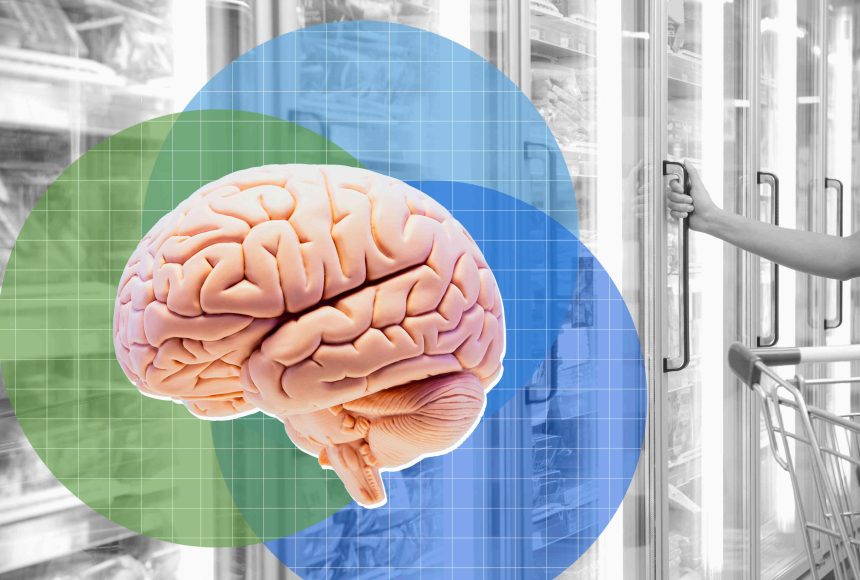As the years pass, our bodies get older, and so do our brains. The good news is there are foods that are packed with nutrients that have been shown to support brain health and cognition. And you don’t have to knock yourself out to find them.
In fact, one of the fastest, easiest ways to load up on brain-friendly nutrients is a trip down the frozen food aisle. There, you’ll find foods that are filled with nutrients that can keep your brain sharp, improve focus and memory and protect against cognitive decline.
If you’re skeptical about frozen foods, you might be surprised to learn that many frozen meals often deliver comparable–if not better–nutrition than their homemade counterparts. One big reason is that frozen foods are flash-frozen at super-low temperatures, so they lock in nutrients at their peak. In addition, frozen foods are affordable, convenient and have a long shelf life, helping to cut down on food waste and save time and money.
Sounds good, but the frozen food aisle is loaded with options. Which are the best for cognition? To find out, we asked nutrition experts to share their top picks. Here’s what they told us.
1. Frozen Berries
Berries, like blueberries, blackberries, raspberries and strawberries, are brimming with nutrients for brain health, especially antioxidants and phytochemicals, says Cheryl Mussatto, M.S., RD, LD, a Kansas-based dietitian. But if you have to choose just one, make it wild blueberries. These little guys are packed with compounds linked to better brain health called anthocyanins. That may be why one study found that people with mild cognitive decline who consumed wild blueberry powder daily for six months demonstrated improved mental processing speed and less cognitive fatigue.
Besides being good for you and delicious, frozen berries are incredibly versatile. Meredith Mishan, M.S., RDN, a registered dietitian and owner of Nourishing Conception, loves adding berries to smoothies and oatmeal, blending them into homemade sorbets or mixing them into muffin or pancake batter. But don’t stop there. For more creative ideas, try these 14 dietitian-approved ways to use a bag of frozen berries.
2. Frozen Leafy Greens
Carolina Schneider, M.S., RD, a Brooklyn, N.Y.-based dietitian, is a big fan of frozen leafy greens like spinach and kale. “Leafy greens are packed with vitamin K, which supports memory and cognitive function,” she says. They’re also a fantastic source of folate, a B vitamin linked to lower odds of dementia. Just one cup of chopped frozen spinach gives you nearly five times the Daily Value (DV) for vitamin K and more than half the DV for folate.
So, go ahead and toss a box or bag of frozen leafy greens into your shopping cart. From smoothies to hearty soups to our Spinach Alfredo Lasagna, they have endless uses! But if you could use more ideas, check out these 12 recipes you can make with a package of frozen spinach.
3. Frozen Cruciferous Vegetables
Like leafy greens, cruciferous veggies like broccoli, cauliflower and Brussels sprouts provide vitamin K. They’re also teeming with phytochemicals and antioxidants that may protect brain cells from free radical damage and inflammation. “Cruciferous veggies also contain sulforaphane, a powerful compound that [may further] protect brain cells from oxidative stress and inflammation,” says Schneider. For instance, one small study found that sulforaphane may help improve processing speed and mood among healthy older folks.
If you’ve ever had mushy frozen broccoli or Brussels sprouts, whip out your air fryer and get ready for some pretty impressive results! No air fryer? No problem. This easy roasting trick delivers crisp, crunchy results every time.
4. Frozen Fatty Fish
Fatty fish, such as salmon, mackerel and herring, are packed with omega-3 fatty acids, which are essential for maintaining the structure and fluidity of brain cells and increasing the blood flow in the brain. No wonder research has found they improve learning and memory.
However, if you’ve ever bought a piece of salmon just for it to spoil in your fridge, you know that fish doesn’t have a long shelf life. That’s where stocking up on frozen fatty fish can help. While frozen salmon is readily available, you can also buy other fatty fish like herring or mackerel from your local fish counter and freeze them yourself.
If you’ve never made mackerel before, you won’t want to miss our Gochujang-Glazed Grilled Mackerel. Or, for a fun, family-friendly meal, try these Crispy Salmon Bites with Creamy Sun-Dried Tomato Dipping Sauce. When you’re really pressed for time, you can even cook frozen fish in your Instant Pot or pressure cooker in less than 30 minutes.
5. Frozen Edamame
Edamame are star legumes for many reasons. These nutrient-rich baby soybeans are packed with protein and fiber. Plus, they’re affordable and easy to prepare. They also happen to be filled with nutrients linked to better brain health, especially soy isoflavones, a type of flavonoid linked to less cognitive decline and dementia. Edamame are also an excellent source of folate, which may help protect against depression. One half-cup of prepared frozen edamame provides more than half the DV for folate in one shot.
Quick, convenient edamame are a win in snacks and main dishes. For a savory snack, simply boil or microwave frozen pods or shelled edamame and top them with your favorite seasoning, like these Edamame with Aleppo Pepper. Edamame also pair beautifully with flavorful rice bowls and sautees, like our Edamame & Veggie Rice Bowl or this 3-Ingredient Teriyaki Edamame Saute.
6. Frozen Butternut Squash
Vibrant orange butternut squash rounds out our list of brain-supporting frozen foods. While fresh butternut squash is usually only available in fall and winter, you can find it chopped and cubed in the frozen veggie aisle in the grocery store year-round.
This nutrient-packed winter squash is loaded with carotenoids, a group of pigments that are responsible for its signature orange color. While carotenoids are best known for promoting healthy vision, they also play a vital role in brain health. That’s because carotenoids have been shown to promote neuroplasticity, helping brain cells and synapses form new connections to promote optimal function and communication.
The really nice thing about frozen butternut squash is you don’t have to peel it. Just heat it in the microwave and toss it into soups, salads or pasta. Need ideas? Check out our 20 Most Popular Butternut Squash Recipes.
The Bottom Line
Like the rest of your body, your brain requires optimal nutrition to function at its best. Vitamins, antioxidants, isoflavones, omega-3 fats and carotenoids have all been shown to promote better cognition. The freezer aisle is a quick, convenient place to load up on foods that are filled with them, like frozen berries, leafy greens, cruciferous veggies, fatty fish, edamame and butternut squash. So, next time you’re in the grocery store, head straight for the frozen food aisle for one-stop shopping for better brain health!








